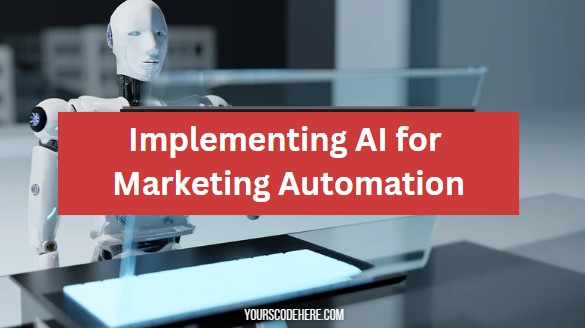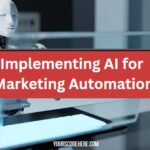Artificial Intelligence (AI) is transforming marketing automation, enabling personalized interactions and efficient campaigns. This guide explores the integration of AI into marketing automation for enhanced efficiency and improved outcomes.
1. Data-Driven Insights with AI:
a. Behavioral Analysis: Utilize AI algorithms to analyze customer behavior, preferences, and interactions across various touchpoints to derive actionable insights.
b. Predictive Analytics: Employ machine learning models to predict customer behavior, such as purchase patterns or churn, allowing proactive campaign adjustments.
2. Personalization and Customer Segmentation:
a. Dynamic Content Generation: Leverage AI to create dynamic content based on user preferences, delivering personalized experiences to segmented audiences.
b. Micro-Segmentation: Use AI algorithms to segment audiences into smaller, more targeted groups for hyper-personalized marketing campaigns.
3. Chatbots and Customer Support:
a. AI-Powered Chatbots: Implement chatbots using natural language processing (NLP) to provide instant, round-the-clock customer support and assistance.
b. Intelligent Response Generation: Train chatbots with AI to understand queries, provide accurate responses, and handle routine customer interactions seamlessly.
4. Campaign Optimization and Automation:
a. AI-Powered Campaign Optimization: Utilize AI algorithms to optimize campaign elements like ad placements, timing, and content for maximum engagement.
b. Automated Campaign Execution: Automate campaign deployment based on AI-driven insights, allowing timely and targeted communication with customers.
5. Predictive Lead Scoring and Conversion Rate Optimization:
a. Lead Scoring Models: Employ AI to score leads based on behavior, demographics, and interactions, enabling prioritization for sales and marketing efforts.
b. Conversion Rate Optimization (CRO): Use AI to analyze website data and optimize landing pages or CTAs for improved conversion rates.
6. Social Media Management and Analysis:
a. Content Scheduling: Automate social media content scheduling based on AI recommendations for optimal engagement times.
b. Sentiment Analysis: Utilize AI-powered sentiment analysis to understand audience sentiments and tailor marketing strategies accordingly.
7. Marketing Attribution and ROI Analysis:
a. Attribution Modeling: Implement AI-driven attribution models to accurately attribute conversions to various touchpoints across the customer journey.
b. ROI Forecasting: Utilize AI algorithms to forecast ROI based on historical data and campaign performance for better budget allocation.
8. Compliance and Ethical Considerations:
a. Data Privacy Compliance: Ensure AI-driven marketing strategies comply with data privacy regulations like GDPR or CCPA for ethical and legal adherence.
b. Ethical AI Use: Employ AI responsibly, avoiding biases and ensuring transparent communication about AI-driven interactions with customers.
Conclusion
AI-powered marketing automation offers unparalleled capabilities, allowing marketers to leverage data-driven insights, enhance personalization, streamline campaigns, and optimize outcomes. By embracing AI in marketing automation ethically and strategically, businesses can unlock new levels of efficiency and effectiveness in their marketing endeavors.










